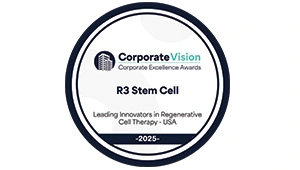Tourette syndrome is commonly thought to be associated with the uncontrollable urge to say swear words, but that is not the case. This condition affects the nervous system and control of our bodies. Some people with the condition may have symptoms like uncontrollable tapping or grunting, as well as words they say to relieve the tic. Stem cell therapy may help patients with Tourette’s get a break from their symptoms and live a life without tics.
WHAT IS TOURETTE SYNDROME?
Tourette syndrome is a disorder that involves the nervous system and motions that can’t be easily controlled called tics. Tics are sudden twitches, movements, or sounds that people repeatedly do. People who have tics cannot stop their bodies from doing these things. For example, a person might keep blinking over and over again. Tics typically show up between ages 2 and 15, with the average being around six years of age. Males are about three to four times more likely than females to develop Tourette syndrome. The first symptoms often are motor tics that occur in the head and neck area. Tics usually are worse during times that are stressful or exciting. They tend to improve when a person is calm or focused on an activity. Before the onset of motor or vocal tics, you’ll likely experience an uncomfortable bodily sensation, called a premonitory urge, such as an itch, a tingle, or tension. Expressing the tic brings often brings relief. With great effort and practice, some people with Tourette syndrome can temporarily stop or hold back a tic. The types of tics and how often a person has them can change over time. Even though the symptoms might appear, disappear, and reappear, these conditions are considered chronic.

In most cases, tics decrease during adolescence and early adulthood and sometimes disappear entirely. However, many people with TS experience tics into adulthood, and, in some cases, tics can become worse during adulthood. Although there is no cure for TS, there are treatments available to help manage the tics and symptoms. Many people with TS have tics that do not get in the way of their daily life and, therefore, do not need any form of treatment or therapy. However, medication and behavioral treatments are available if tics cause pain or injury or if they interfere with school, work, or social life. The exact cause of Tourette syndrome isn’t known. It’s a complex disorder likely caused by a combination of genetic and environmental factors. Chemicals in the brain that transmit nerve impulses, called neurotransmitters, including dopamine and serotonin, might play a role in the pathophysiology of the condition.
HOW CAN STEM CELL THERAPY HELP PATIENTS SUFFERING FROM TOURETTE SYNDROME?
Researchers have used stem cell therapy to treat rats that had Tourette’s with success. They have reduced the number of neurological symptoms that the rats had with stem cells. Just one week after stem cells were transplanted into the brains of these rats, protein levels that cause TS were decreased, and symptoms were alleviated.
Contact US

Dr. David Greene
MD, PhD, MBA
Dr. David Greene, MD, PhD, MBA, is a pioneering leader in regenerative medicine and healthcare marketing. As a residency and fellowship-trained orthopedic surgeon, Dr. Greene transitioned from clinical practice to become the founder and CEO of R3 Stem Cell and US Lead Network, where he has revolutionized patient care and medical practice growth through innovative therapies and digital marketing strategies. He has authored two influential books on healthcare internet marketing, ranks among the top expert authors globally, and has been featured on the cover of Corporate Vision magazine for his impact on global regenerative therapies. Beyond his professional achievements, Dr. Greene is passionate about education, compassion, and continuous innovation.












No Comments